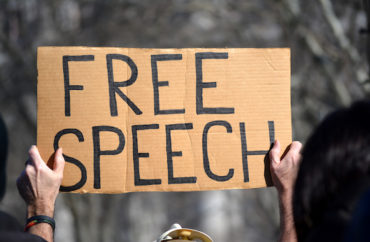
Nearly 20,000 students attending 55 different colleges and universities nationwide were asked recently about various free speech issues on their campuses — and the results are in.
Their answers were used by the Foundation for Individual Rights in Education and RealClearEducation to create a lengthy list of the best and worse colleges for free speech, according to these students’ answers.
The database is titled the “2020 College Free Speech Rankings.”
Leading the pack for the best in free speech is the University of Chicago, which maintains its reputation thanks in large part to its Chicago Statement, which has served as model guidance for allowing freedom of speech and expression at its campus and many others nationwide since 2014.
Coming in ranked last is the Indiana-based DePauw University, which also had the highest percentage of students who said they’ve self-censored.
The online survey was conducted in April and May of this year by CollegePulse.
“These rankings are based on the voices of 20,000 currently enrolled students at 55 colleges and are designed to help parents and prospective students choose the right college,” according to the groups’ findings, released Tuesday.
They’ve released an interactive database that allows students and parents to check out the rankings using a variety of parameters.
Among the survey’s key findings, seven of the colleges that ranked in the top 10 best for free speech are large public state universities, and only one Ivy League institution made the list, Brown University.
In contrast, the report notes, “seven of the colleges ranked in the bottom 10 are private, with undergraduate enrollments at five of those seven below 10,000. Three of the bottom 10 colleges are in the Northeast, including two members of the Ivy League.”
The top 10, in order, are: University of Chicago, Kansas State University, Texas A&M, UCLA, Arizona State University, University of Virginia, Duke University, Virginia Tech, Brown University, and the University of Arizona.
The bottom 10 on the list of 55 campuses surveyed are: DePauw University, University of Texas at Austin, Louisiana State University, Dartmouth College, Syracuse University, Oklahoma State University, Brigham Young University, Georgetown University, Wake Forest University and Harvard University.
The scores were derived by asking students’ various questions about campus openness to different topics, tolerance for discussing controversial views, administrative support for free speech, the ability of students to comfortably self-express, speech codes, and the ideological diversity of the student body.
One of the more alarming findings of the survey is that the vast majority of students responded that they are opposed to allowing speakers with controversial views on campus.
On another note, several of the campuses on the top 10 list have had major free speech controversies in recent times, including at the University of Chicago, Arizona State, Brown and UCLA.
The report acknowledges this, but notes, “Nevertheless, according to the students surveyed, the top 10 colleges are doing something right regarding freedom of speech and expression on campus, particularly compared to colleges near the bottom of the rankings.”
“Eight of the top 10 colleges have a Green speech code rating from FIRE, while the other two colleges (Virginia Tech, ranked 8th, and Brown University, ranked 9th) have a Yellow rating. Four of these colleges have endorsed the Chicago Principles. Most of them enroll more than 10,000 undergraduate students,” the report adds.
“The opposite is largely the case for the bottom 10 colleges. Eight of them have a rating
of either Warning (Brigham Young, which does not promise free speech at all) or Red, the
remaining two colleges are rated Yellow, and only two of the ten have adopted the Chicago
Principles. Half of these colleges enroll under 10,000 undergraduates.”
To view the entire report, click here.
MORE: Most students *oppose* allowing campus speakers on controversial topics
IMAGE: Shutterstock





Please join the conversation about our stories on Facebook, Twitter, Instagram, Reddit, MeWe, Rumble, Gab, Minds and Gettr.